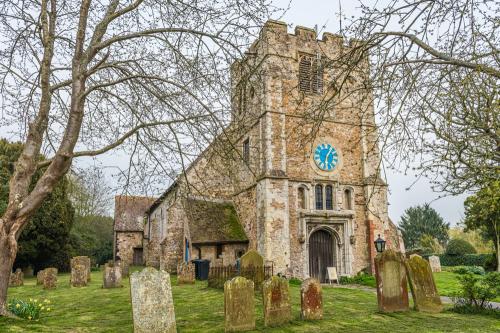
Appledore's medieval parish church, dedicated to St Peter and St Paul, stands a short stroll from the Royal Military Canal. The church was mentioned in the Domesday Book of 1086, when it was under the patronage of the convent of Christ Church, Canterbury.
History
No trace remains of the church built by the monks of Christ Church and in the early part of the 13th century the patronage was granted to St Martin's Priory in Dover. It was almost certainly they who built the present church.
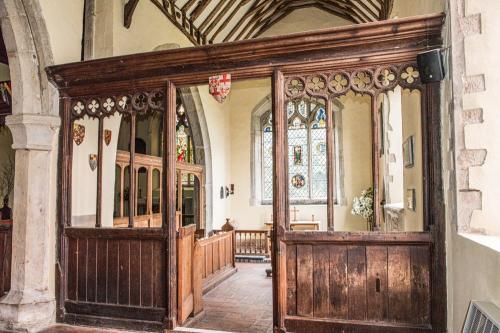
That 13th-century building was badly damaged in a devastating French raid in 1380, and only the west tower and the 12th-century north chapel survive from before the raid. The chapel probably began as a separate building, but it was incorporated into the church when it was rebuilt. Over the centuries, this chapel has seen use as a schoolroom, organ chamber, and church vestry.
When the nave floor was taken up during restoration work in 1925, a large amount of wood ash was found. It is highly likely that this was created during the 1380 burning of the church during the French attack on Appledore.
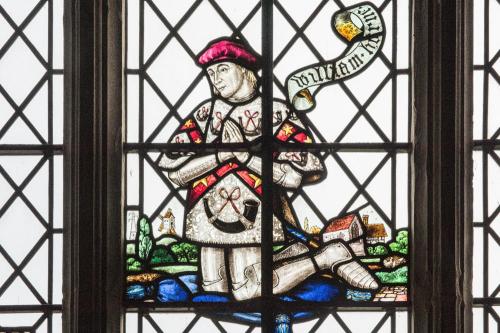
Historical Highlights
One historical feature of Appledore church is the striking west doorway of the tower, which is decorated with armorial shields, including one bearing the arms of William Wareham, Archbishop of Canterbury from 1503-1532.
Inside the door is a holy water stoup dated to the 13th century and nearby is an octagonal 15th-century font.
Traces of a medieval wall painting remain the spandrels of the southern nave arches. The painting portrays St George battling a dragon, while a maiden waits to be rescued under the eyes of a king and queen, who watch from the battlements of a castle.
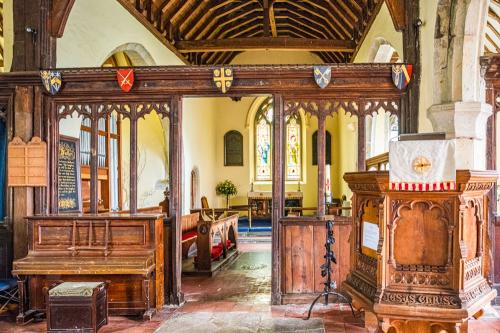
Medieval Screens
The church boasts three medieval screens, joined together to separate the main body of the church from the chancel and two chapels. The north and south sections of the screen date from 1380, just after the French burned the church. The centre section was added later, perhaps in the early 15th century.
In the south chapel is a tomb niche decorated with both quatrefoil and trefoil carvings, including the figure of a priest's head. Under the niche is a table tomb made of Bethersden marble.
Over the tomb niche is a window with colourful stained glass, including a knight on horseback and a kneeling figure identified as William Horne, whose family built the chapel. The family lived at Horne Place, which is just outside of the village.

You can see medieval tiles set into the floor at the west end of the church and in the south chapel. These tiles were discovered during the 1925 restoration.
On the north wall is a memorial to James Wyatt, who served with the Royal Staff Corps. This unit was responsible for building much of the Royal Military Canal. Wyatt fought in the Peninsular War and at the Battle of Waterloo.
There are six 18th-century oval text boards in the nave, and on the west wall is a painted royal coat of arms to George III, dated to 1794. This royal coat of arms bears the names of the churchwardens at that time, William Paine and William Boon.
Set into the chancel floor is the original medieval altar stone, still bearing two consecration crosses. On the sacristy door is a small brass of a woman wearing Tudor costume.
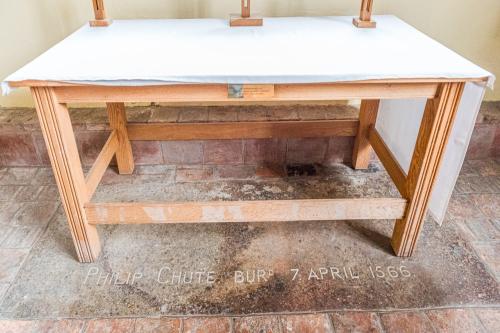
The Tudor Standard Bearer
Philip Chute, standard bearer to King Henry VIII and Captain of Camber Castle, near Rye, was buried under the chancel in 1567. Centuries later, the Munk family inserted a vault under the floor and Chute's remains were discarded.
During the 1925 restoration, Chute's jawbone was rediscovered and reburied under the altar, beneath a new grave slab (the slab bears the incorrect date of 1566 for Chute's death).
Visiting
The church is open daily to visitors and was open when we visited. It is located on The Street (the B2080) in the heart of Appledore. There is no dedicated parking, but there is a car park about 600 yards further up The Street, outside the village hall.
About Appledore, St Peter and St Paul Church
Address: The Street,
Appledore,
Kent,
England, TN26 2DB
Attraction Type: Historic Church
Location: Near the Royal Military Canal, just off The Street. Parking in the village hall car park.
Website: Appledore, St Peter and St Paul Church
Location
map
OS: TQ957292
Photo Credit: David Ross and Britain Express
HERITAGE
 We've 'tagged' this attraction information to help you find related historic attractions and learn more about major time periods mentioned.
We've 'tagged' this attraction information to help you find related historic attractions and learn more about major time periods mentioned.
Historic Time Periods:
Find other attractions tagged with:
12th century (Time Period) - 13th century (Time Period) - 14th century (Time Period) - 15th century (Time Period) - Henry VIII (Person) - Medieval (Time Period) -
NEARBY HISTORIC ATTRACTIONS
Heritage Rated from 1- 5 (low to exceptional) on historic interest
Horne's Place Chapel - 0.9 miles (Historic Building) ![]()
Fairfield, St Thomas Becket Church - 1.8 miles (Historic Church) ![]()
Smallhythe Place - 4.1 miles (Historic Building) ![]()
Tenterden, St Mildred - 5.2 miles (Historic Church) ![]()
Tenterden and District Museum - 5.3 miles (Museum) ![]()
Kent and East Sussex Railway - 5.3 miles (Family Attraction) ![]()
Old Romney, St Clement's Church - 5.4 miles (Historic Church) ![]()
Rye Art Gallery - 5.9 miles (Museum) ![]()
Nearest Holiday Cottages to Appledore, St Peter and St Paul Church:
More self catering near Appledore, St Peter and St Paul Church










